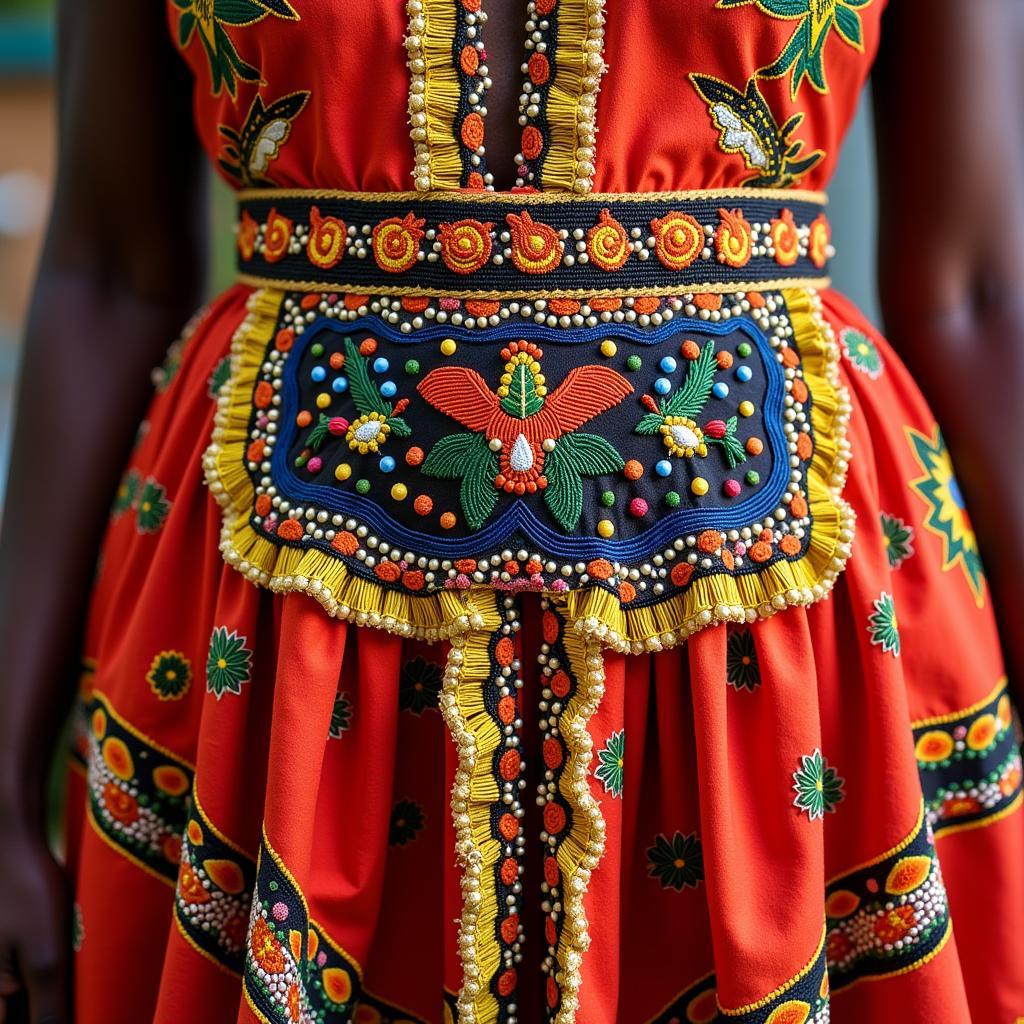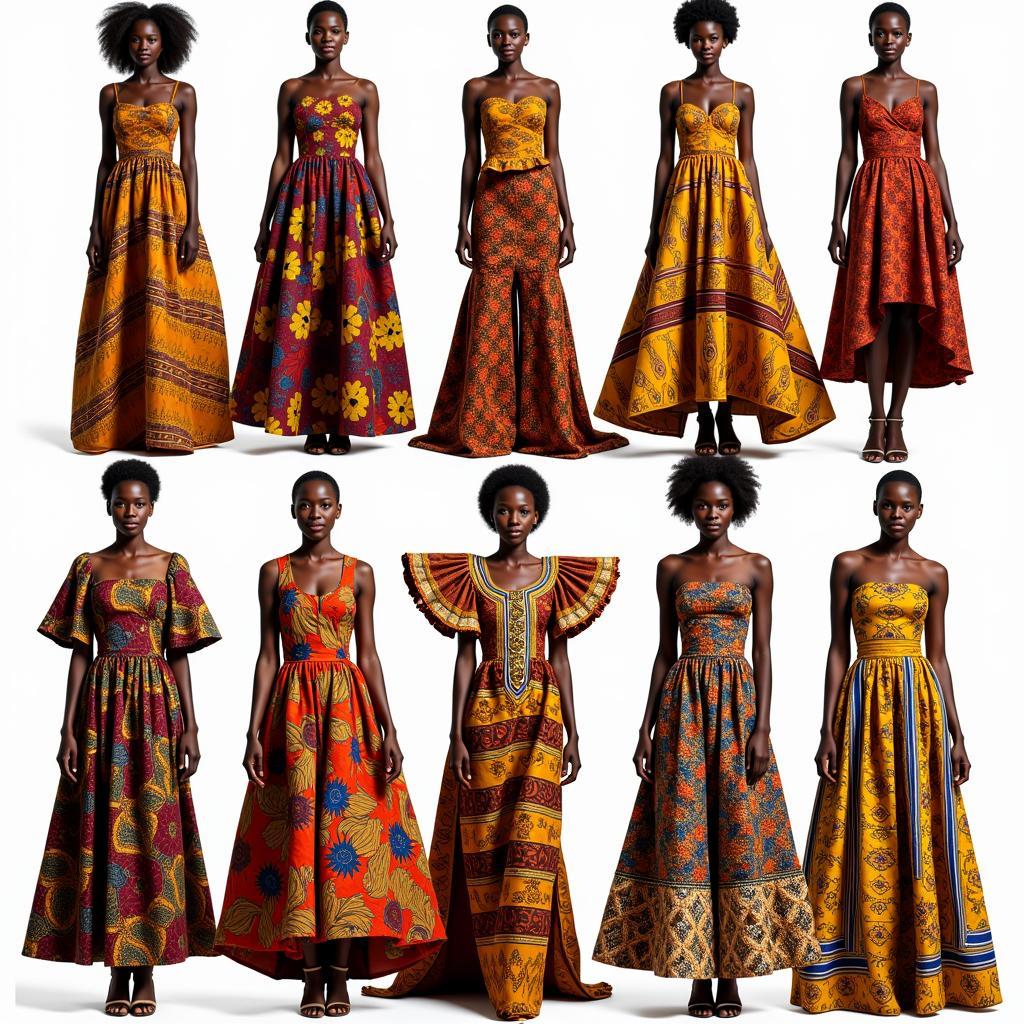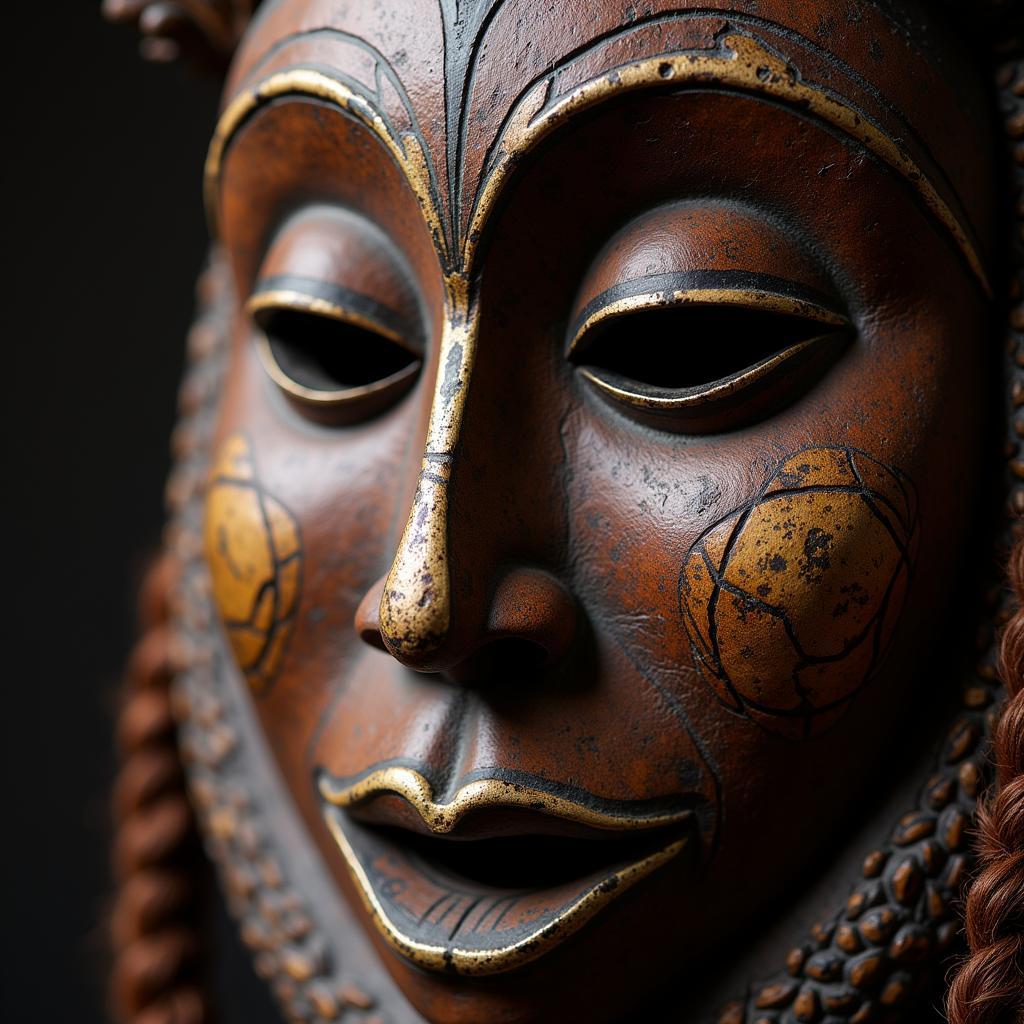A Journey Through African Ethnic Dresses
African Ethnic Dresses are more than just clothing; they are vibrant expressions of culture, heritage, and artistry. From the intricate beadwork of the Maasai to the flowing robes of the Tuareg, each garment tells a story, reflecting the unique identity of its wearer and their community. This article delves into the captivating world of African ethnic dresses, exploring their rich history, diverse styles, and significance in contemporary society. We’ll examine the intricate details, symbolism, and the enduring legacy of these remarkable garments.
The beauty of African ethnic dresses lies in their incredible diversity. Each region and tribe boasts its own distinct style, incorporating unique fabrics, patterns, and embellishments. For instance, the Kente cloth of Ghana, with its bold geometric patterns and vibrant colors, is a powerful symbol of national pride and cultural heritage. Similarly, the Aso Oke fabric of Nigeria, known for its intricate weaving and luxurious texture, is often worn for special occasions and ceremonies. Check out more about African designs for women.
The Symbolism Woven into African Ethnic Dresses
African ethnic dresses often carry profound symbolic meaning. Colors, patterns, and accessories can represent social status, marital status, or spiritual beliefs. For example, the red ochre used by the Himba people of Namibia symbolizes beauty and vitality, while the intricate hairstyles and beaded jewelry of the Maasai reflect their age and social standing. Understanding these symbols unlocks a deeper appreciation for the cultural richness embedded within each garment.
 African Dress Symbolism: Exploring the cultural significance embedded in traditional garments
African Dress Symbolism: Exploring the cultural significance embedded in traditional garments
From Everyday Wear to Ceremonial Garments: A Spectrum of Styles
African ethnic dresses encompass a wide range of styles, from everyday wear to elaborate ceremonial garments. While some dresses are designed for practical comfort and functionality, others are reserved for special occasions like weddings, festivals, and rituals. These ceremonial dresses are often adorned with intricate beadwork, embroidery, and other embellishments, showcasing the exceptional craftsmanship and artistry of African artisans. For a glimpse into African cultural imagery, you can explore more visual representations here.
Preserving Tradition in a Modern World: The Evolution of African Ethnic Dresses
As Africa continues to evolve, so too do its traditional dresses. While many communities strive to preserve their cultural heritage by adhering to traditional designs and techniques, others embrace innovation, incorporating modern elements into their attire. This fusion of tradition and modernity results in dynamic and exciting new styles, reflecting the changing landscape of African fashion. You might be interested in seeing some beautiful examples of African attire wedding dresses.
 Modern African Fashion: Showcasing the fusion of traditional elements with contemporary design
Modern African Fashion: Showcasing the fusion of traditional elements with contemporary design
Where to Find Authentic African Ethnic Dresses
Whether you’re looking for a vibrant Dashiki, a flowing Boubou, or a intricately beaded Kente cloth, finding authentic African ethnic dresses is easier than ever. You can explore local markets and boutiques in African countries, or browse online retailers specializing in African fashion. By supporting African artisans and businesses, you’re not only acquiring a beautiful garment but also contributing to the preservation of African cultural heritage. Want to see African dance in action? Check out this GIF!
The Future of African Ethnic Dresses: A Global Celebration
African ethnic dresses are gaining increasing recognition on the global stage, influencing fashion trends and inspiring designers worldwide. As more people discover the beauty and artistry of these garments, the future of African fashion looks bright, promising a continued celebration of cultural heritage and artistic expression.
 African Mask Artistry: A close-up view of the intricate craftsmanship and detail in African masks.
African Mask Artistry: A close-up view of the intricate craftsmanship and detail in African masks.
In conclusion, African ethnic dresses are a testament to the continent’s rich cultural heritage and artistic ingenuity. From the vibrant colors and intricate patterns to the symbolic meanings woven into each garment, they offer a captivating glimpse into the diverse traditions and vibrant spirit of Africa. By appreciating and celebrating these remarkable garments, we contribute to the preservation of a vital part of global cultural heritage. Continue exploring the world of African ethnic dresses and discover the stories they tell.
FAQ
-
What is the significance of Kente cloth?
Kente cloth is a handwoven textile from Ghana, representing royalty, prestige, and cultural heritage. -
What are some common fabrics used in African ethnic dresses?
Common fabrics include Kente, Aso Oke, Ankara, and Mudcloth. -
Where can I buy authentic African ethnic dresses?
You can find them in local African markets, boutiques, or online retailers specializing in African fashion. -
How can I learn more about the symbolism in African dresses?
Research specific tribes and their traditions, visit museums, or consult with cultural experts. -
Are African ethnic dresses only worn for special occasions?
No, some are for everyday wear, while others are reserved for ceremonies and special events. -
How are African ethnic dresses evolving in modern times?
Designers are blending traditional elements with contemporary styles, creating dynamic new looks. -
Why is it important to support African artisans and businesses?
Supporting them contributes to the preservation of African cultural heritage and economic empowerment.
Here are some other topics you might be interested in exploring: African designs for women.
If you need any further assistance, please contact us at Phone: +255768904061, Email: kaka.mag@gmail.com, or visit us at Mbarali DC Mawindi, Kangaga, Tanzania. We have a 24/7 customer service team available to help.
